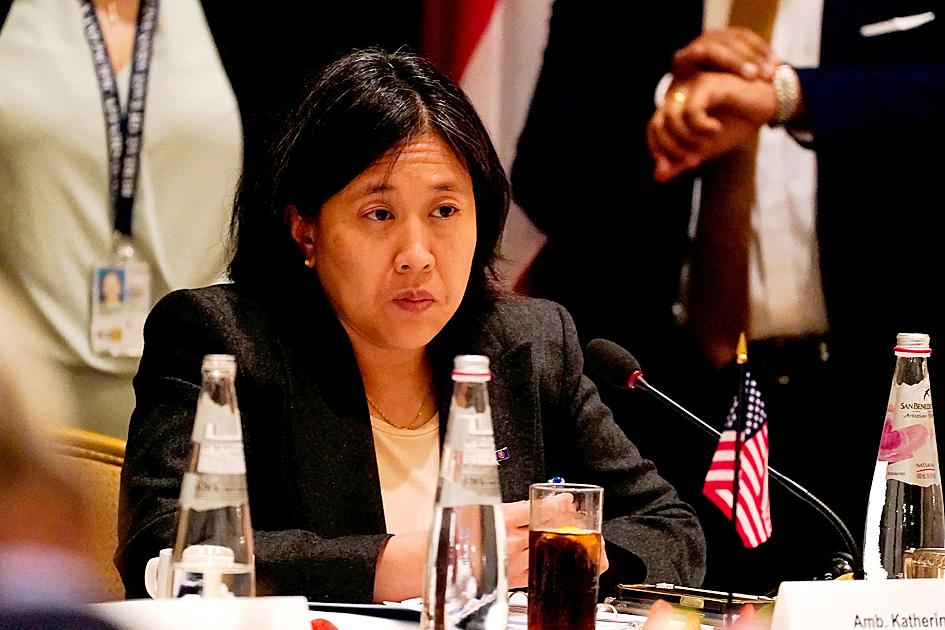US tariffs on more than US$300 billion in annual imports from China provide significant leverage and are useful from a negotiating standpoint, US President Joe Biden’s trade chief said on Wednesday amid a debate within his administration on whether to keep the duties in place.
“The China tariffs are, in my view, a significant piece of leverage, and a trade negotiator never walks away from leverage,” US Trade Representative Katherine Tai (戴琪) told a senate hearing in response to a question from US Senator Bill Hagerty about whether removing the duties would encourage “more bad behavior” by Beijing.
The comments came after Biden on Saturday said that he was in the process of making up his mind on whether to remove any of the duties. They were first imposed by then-US president Donald Trump in 2018 to pressure China to end intellectual property abuses and the practice of forced-technology transfer.

Photo: Reuters
Tai also said that there was “a limit to what we can do” to ease inflation through tariff changes.
“Next steps on actions, they’re pending” with Biden right now, Tai told the senators.
The remarks contrast with those of US Secretary of the Treasury Janet Yellen, who earlier this month said that the tariffs have hurt US consumers and businesses, and are contributing to the fastest inflation in 40 years.
Reductions in the duties could help bring down prices, Yellen said, while acknowledging that cuts are not “a panacea” for addressing inflation.
The Biden administration is looking to “reconfigure” the tariffs, she said.
US Secretary of Commerce Gina Raimondo also said earlier this month that it “may make sense” to lift tariffs on some goods as a way to tame inflation.
The US must use all available tools and develop new ones to defend its economic interests and values against China’s unfair practices after talks showed clear limits to the nation’s willingness to live up to past commitments, Tai said on Wednesday.
The US, through direct discussions with Chinese leaders starting in October last year, pressed Beijing to live up to the so-called phase one trade agreement reached with the Trump administration, the US trade representative said.
However, several rounds of “difficult discussions” made clear that the nation is not interested in fully following through, she said.
“This has become part of a pattern,” Tai said. “The United States has repeatedly sought and obtained commitments from China, only to find that lasting change remains elusive.”
The US now needs to turn the page on the old playbook, she said, repeating previous comments.
The US has brought a renewed focus to engaging with partners and allies that are hurt by China’s unfair trade and economic practices, Tai said.
Biden recognizes that the US needs to work with other countries to confront policies that “are fundamentally at odds with the modern global trading system,” she said.

Quanta Computer Inc (廣達) chairman Barry Lam (林百里) is expected to share his views about the artificial intelligence (AI) industry’s prospects during his speech at the company’s 37th anniversary ceremony, as AI servers have become a new growth engine for the equipment manufacturing service provider. Lam’s speech is much anticipated, as Quanta has risen as one of the world’s major AI server suppliers. The company reported a 30 percent year-on-year growth in consolidated revenue to NT$1.41 trillion (US$43.35 billion) last year, thanks to fast-growing demand for servers, especially those with AI capabilities. The company told investors in November last year that

Intel Corp has named Tasha Chuang (莊蓓瑜) to lead Intel Taiwan in a bid to reinforce relations between the company and its Taiwanese partners. The appointment of Chuang as general manager for Intel Taiwan takes effect on Thursday, the firm said in a statement yesterday. Chuang is to lead her team in Taiwan to pursue product development and sales growth in an effort to reinforce the company’s ties with its partners and clients, Intel said. Chuang was previously in charge of managing Intel’s ties with leading Taiwanese PC brand Asustek Computer Inc (華碩), which included helping Asustek strengthen its global businesses, the company

Taiwanese suppliers to Taiwan Semiconductor Manufacturing Co. (TSMC, 台積電) are expected to follow the contract chipmaker’s step to invest in the US, but their relocation may be seven to eight years away, Minister of Economic Affairs J.W. Kuo (郭智輝) said yesterday. When asked by opposition Chinese Nationalist Party (KMT) Legislator Niu Hsu-ting (牛煦庭) in the legislature about growing concerns that TSMC’s huge investments in the US will prompt its suppliers to follow suit, Kuo said based on the chipmaker’s current limited production volume, it is unlikely to lead its supply chain to go there for now. “Unless TSMC completes its planned six

Power supply and electronic components maker Delta Electronics Inc (台達電) yesterday said it plans to ship its new 1 megawatt charging systems for electric trucks and buses in the first half of next year at the earliest. The new charging piles, which deliver up to 1 megawatt of charging power, are designed for heavy-duty electric vehicles, and support a maximum current of 1,500 amperes and output of 1,250 volts, Delta said in a news release. “If everything goes smoothly, we could begin shipping those new charging systems as early as in the first half of next year,” a company official said. The new